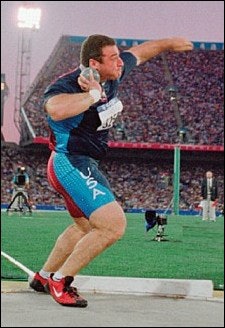The Salt Lake City Bribery Scandal Prompted Wholesale Changes to the Bid Process, But That Hasn't Made Things Easier for the U.S. Cities Still Hoping to Host the 2012 Olympics

How badly do you want to host the 2012 Olympic Games? Really, it's as simple as this: Spend five years fund-raising and then burn through as much as $10 million hosting amateur events, hiring consultants and, ultimately, producing a 600-page document that spells out your plan in detail. Then submit it to the United States Olympic Committee and, if you're lucky, USOC officials will tell you to start all over again from scratch - only this time, show them more. A year from now, and no one knows how many millions of dollars later, you might be chosen as the American bid city - and then, three years after that (more fundraising, more millions), you just might be chosen as the 2012 host.
Again, that's if you're lucky. If on the other hand you were a representative of, say, the Tampa/Orlando regional bid team, what you got for your years of effort and sizable investment was a "Too bad, kid, come see us in 2028." The USOC, which made you travel all the way to Colorado Springs to hear the bad news, then sent you back home to your constituents and your donors without so much as an explanation of how your bid stacked up against the other seven regions struggling to stay in the game.
Complaining about all this would only make you seem like a sore loser. And yet, it says something about the Olympic bid process that, even now, just after the rules were changed to make the bid process more fair, it still plays out like an Olympic sport in which technical merit is lost in the glare of artistic presentation. And worst of all, some of the decisions made by the USOC, and its justifications for those decisions, seem almost designed to keep this impression alive.
But we're getting ahead of ourselves. To tell the continuing saga of the 2012 bidding (the final chapter is still three-plus years away from being written), we must go back to 1996. It was then, with the Atlanta Games in full swing, that the first cities began putting out feelers for 2012. To gain a deeper appreciation of the kind of forward thinking it takes to enter this kind of cutthroat competition, take a moment to consider the state of the Olympic Movement, 1996:
• The 1993 selection of the 2000 Summer Games host had elicited charges of voter impropriety when Sydney defeated Beijing by two votes after Beijing led in every previous round of voting.
• Anyone hoping to land the 2012 Games would enter the process knowing that Salt Lake City would host the 2002 Winter Games and that Toronto was among the cities vying to win the 2008 Summer Games. A Toronto win (the 2008 vote would take place in 2001) would make a North American host in 2012 a virtual impossibility.
• The Atlanta Games plan generated controversy locally almost from the outset, from businesses displaced by Olympics-related construction to community members angered by the prioritization of corporate sponsorship by the Atlanta Committee for the Olympic Games (ACOG).
• Casualties of the Atlanta Games themselves included three ironworkers killed during construction of the Olympic Stadium and one reveler killed (and scores injured) by a bomb planted in Centennial Olympic Park.
Surprisingly, all this was not enough to frighten anybody away. According to Keith Ferguson, the USOC's acting program director of bid city administration, the eventual pool of eight regions vying to be the U.S. host city was five bids more than were attracted by any previous Games.
The first city to throw its proverbial hat into the ring was Cincinnati, which in 1996 began a seven-year, $7 million fundraising campaign that underwrote the effort through 2002 - as it turned out, about 13 months longer than Cincinnati's hopes to host the Games survived. Washington and Baltimore began the process separately in 1997, eventually combining their assets into the Chesapeake Region 2012 Coalition. Los Angeles, Houston, Dallas, New York, Tampa/ Orlando and the San Francisco Bay Area rounded out the field.
Why do it? Obviously, having a shot at the vast sums of money that (at least in the age of corporate sponsorships) accrue to the eventual host is a big draw. But for many cities, there was a bigger reason. Says Beth Snyder, Cincinnati 2012's director of bid development, producing a 2012 bid was a chance to put her city on the international map.
"Anytime you can get national exposure for something that has such international appeal, I think it's a substantial benefit," she told AB just days before the USOC voted Cincinnati out. Reminded that oddsmaker Danny Sheridan of USA Today had listed Cincinnati a 1,000,000-to-1 long shot against winning the U.S. bid, Snyder could only laugh - and reconsider. "Other than when you see something like that," she said. "We thought that was kind of mean. But we know what the Midwest has to offer."
An Olympic bid starts with what you might call The Mother of All Feasibility Studies. Both a road map for the city's eventual staff and a sales document for helping raise capital, the initial feasibility study typically involves a cursory identification of the big picture: facilities, accommodations and transportation. It's like the club soccer tournament or state high school basketball tournament multiplied by a factor of 1,000: Athletes, team personnel, members of the international media, Games workers and spectators will all arrive pretty much simultaneously. They'll need flights in and out, places to stay and places to compete.
Although this sounds like a major undertaking, many of the people who have tried it describe it as a fairly small obstacle to get past.
"Ours wasn't as much a feasibility study as it was actual planning, because we did a more rudimentary feasibility check and it became pretty obvious that we could do it," says Dan Kneis, president of the Chesapeake Region 2012 Coalition. "The only question was how."
Well, right - at some point, the hows (and the whats and the wheres) will have to be spelled out. Each of the sports facilities will have to be chosen with an eye toward meeting the specifications of each sport's international governing body. If facilities need to be modified or built, specifics on their funding and construction, and a timetable for both, will need to make sense to the organizing committee, the public, the architectural and construction teams, and the USOC. If transportation and other areas of the region's infrastructure need to be upgraded, there had better be a plan in place to deal with it.
While this is the part of the bid that is the most quantitative, even this can't help but involve a great deal of guesswork. Ferguson says the reason is simple: Things change.
"In no Olympic Games in memory has the original bid been exactly what was chosen in the end," he says. "Venues change as requirements for the sports change. For example, women's wrestling has been added to the program for 2004 and 2008, and when Athens bid for the 2004 Games, that was not part of the program. The sports program we're operating off of right now is what was proposed for 2008, but that could very easily change depending on what the IOC decides between now and then."
While most of the U.S. bidders admit to an unwritten Plan B (and in some cases, Plan C), changes to the bid are said to be becoming a thing of the past, if only because the USOC is so focused on winning the 2012 bid that it has expended a huge amount of effort to provide cities with a blueprint for success. Certainly, the Atlanta experience of Jose Rodriguez, managing director of Tampa/Orlando's failed 2012 bid who for five years was ACOG's director of sports, won't be duplicated this time around. "We changed 60 percent of all the venues that were put forth in the bid document," Rodriguez says. "I think that bid was put together in a day and age when technical aspects of the bid weren't looked at as closely as they are now. When they first took me out to where they told me the rowing venue was going to be, I couldn't see room for 2,000 meters and there was an island in the middle of the course. Things like that would never fly nowadays."
For this, we can all thank the Salt Lake City bribery scandal. Meeting for what it called an "Extraordinary Session" in late 1999, the IOC adopted a list of 18 "themes" that it said would henceforth be the basis for comparing bids. These were:
1. National, Regional and Candidate City Characteristics 2. Legal Aspects 3. Customs and Immigration Formalities 4. Environmental Protection and Meteorology 5. Finance 6. Marketing 7. & 8. Sports and Concept 9. Paralympic Games 10. Olympic Village 11. Medical/Health Services 12. Security 13. Accommodation 14. Transportation 15. Technology 16. Communications and Media Services 17. Olympism and Culture 18. Guarantees
After consideration of the merits of these areas - "I don't call them 'themes,' I call them imperatives for the appropriate hosting of the games," says Charles Moore, chair of the USOC's bid selection task force - the USOC chose 11 for its version and added two of its own (International Strategies and Partnership Ability). At a Philadelphia meeting in 1998, the USOC handed each city representative a three-ring binder detailing its expectations for candidate cities.
"It was a matter of putting together committees to work on each theme," Rodriguez recalls. "So we put together a security committee, a sports committee, a medical committee and so on. More than 400 people were involved. And we began to have many, many meetings about what our overall theme was going to be. 'Celebrate the Journey' took us about two years to figure out. Why? Because we wanted to develop a theme for our bid that could be translatable into different languages. 'Celebrate the Journey' delivers a strong message about the journey taken by the athletes, the families that support them, the coaches and the community, too."
This combination of tangible and ethereal aspects is one of the more intriguing qualities of the Olympic bid process. No one involved likes to call it "guessing" - but then, what else would you call trying to create a budget that will make sense 15 years from now, and at the same time choosing a slogan that will entrance 129 IOC voters seven years from now?
"I wouldn't call it guessing, but it surely isn't as firm as it will have to be when it gets closer to 2012," says Kneis. "You clearly look at Olympic history, try to extrapolate forward, but then you temper that against what's happening in the world. For example, I don't think we'll see nearly the growth in sponsorship revenues between 2002 and 2012 that we saw between 1990 and 2000. We're thinking it's going to come back down to earth, so we used a much flatter profile from this day forward than would have been used six or eight years ago."
Indeed, the current recession might give way to another boom - and another bust, even - by the time the Olympics next take place on American soil.
"That's where your crystal ball comes in," Kneis says. "A lot can happen between now and 2012."
Prior to the Oct. 26 vote that knocked out Cincinnati, Dallas, Los Angeles and Tampa/Orlando, Cincinnati's Snyder said about the USOC, "I've been very impressed. A lot of the evaluation process was tailored by what they know the IOC will be looking for. They have a clear set of criteria and they used a very objective process."
After the fact, though, much grumbling has been in evidence, albeit primarily by people (such as reporters) who weren't intimately involved in the process. It should be noted that the bidcity representatives agreed beforehand - most of them, anyway - that not only would the USOC's ratings not be made public, they wouldn't be available privately to the winners or losers, either. Nick Vehr, president of the Cincinnati bid team and an almost legendary River City booster, confesses that although part of him would like to see how Cincinnati stacked up against its rivals, mostly he's "content to move on." He feels this way even though some of the comments of the USOC officials at the press conference that followed the initial winnowing-down vote left him mystified about what, exactly, they'd been evaluating. In particular, Moore's assertion that "three of the four cities to make the cut ranked in the top three in six of eight categories that together counted for 74 percent of the total" left Vehr's head spinning. "That's like one of those high school math problems," Vehr says. "I'm not sure what all that means. Nor do I care. There's a part of me that's curious, but another that knows that nothing is going to change the outcome. Therefore, let's build on the positive and move from there."
Rodriguez is curious, too, mainly because of Moore's other press-conference assertion, that none of the losing cities placed in the top three in more than one of the eight most-important categories. Noting that Orlando alone has more hotel rooms than any previous Olympics host, as well as south Florida's careful cultivation (as part of its international strategy) of ties to Central and South American sports organizations, Rodriguez wonders whether the task force - well, he just wonders. "I have known most of the people on that committee for many years; they're my friends and I have a lot of respect for them," he says. "But I'm still baffled by their decision."
Part of the problem is that in choosing to delineate its areas of expectation and to stress the mathematics that produced the winners - while at the same time keeping the final tally a secret - the USOC has in essence asked the bid cities and interested onlookers to trust that they did the math correctly. But the larger problem is that the areas of expectation themselves are to a large degree qualitative rather than quantitative. That's how you end up with explanations like Moore's: "Depending on this or this or this, I might score one aspect six to eight, as opposed to 7.2. Another I might score a 7.2. And then to center that data we take the average of the lows, average of the highs and all this stuff. There's a lot of math."
Added to this is the fact that the USOC's two new themes would seem to defy one's ability to attach a meaningful number to them. Here's the first, as described by Ferguson: "International Strategies involves both the appeal of the city and the strategy they have, such as the ethnic makeup of the city. San Francisco is well-known to the Pacific Rim and Asian communities, while New York is known in other parts of the world, Houston in other parts of the world, and Washington with a whole different group."
Partnership Ability, meanwhile, doesn't mean the ability of the bid city to secure sponsorships further down the line - the USOC and IOC have largely centralized that task - it means the USOC's assessment of its ability to get along with the bid city representatives. "It's a long time that you work together," Moore says - but in the next breath, he notes that since the makeup of the bid city's organizing committee will change over time, what the task force scored in this case was "the institutionalization of the committee." In other words, the quality of its leadership - including the task force's opinion of the spirit within the community and the engagement of senior business leaders and elected officials - as it stands now and as it might be a decade from now. Part of this, Moore says, involved reminding the bidders of the "strong potential that the U.S. winner will not win the 2012 Games. Do they have the staying power to go on to 2016 or 2020?"
In order for the task force to get an honest appraisal of Partnership Ability, an explanation of the category was not offered to the bid cities in advance. In fact, it was not one of the eight areas in which a formal presentation was required, like housing, transportation or sports facilities. Vehr's only problem with this theme had to do with its subjectivity, not the way it was (or rather, was not) presented to the bid teams. "To be honest, if they had told us to present on it in advance, they would have gotten a skewed assessment, rather than just coming in and seeing it and feeling it for themselves," Vehr says. "Any city worth its salt would have realized it was a critical part of the evaluation anyway, and should have found ways to address it - as we certainly did."
The USOC offers an Orwellian-sounding hedge when asked whether subjectivity has been removed as much as possible from the evaluation process. "The object of this exercise was to reduce not only the subjectivity but to actually put down things that can be compared," Ferguson says. "So I'm not going to answer that question directly; I'm going to say that the goal of this process was to compare the cities against the standard set by the IOC."
Ferguson and Moore maintain that this is what the task force did - that no comparisons were made between cities, only between each city and "par" - and that subjectivity was therefore blunted. But if this strikes you as merely a semantic exercise, you have plenty of company.
"All of us understood that there would be an element of subjectivity," says Vehr. "You just can't avoid that. Of course they had to compare cities to each other, in one way or another."
Rodriguez is the most outspoken on this point. "I've heard some people say that Tampa is a second-tier city," he says. "To tell the truth, I think in the end that's what it came down to. When you look at the four cities they selected, I think they took the easy way out."
Moore says he's not looking to debate the subject. "They've all spent somewhere on the order of $5 million to get this far, and many of them, particularly the committee heads, have devoted the past five years of their lives to it, so they're pretty passionate," he says. But, he notes, the entire point of the process was to avoid such preconceived notions that could damage the "long-term partnerships" the USOC has sought with all potential bid cities.
"These were all great cities, and any one of them could host the Games. In our assessment, some could host them better," says Moore. "I sat down with each one before the final press conference and gave them a head's up on their total bid, and I said, 'These areas appear to be O.K., but these areas appear to be a challenge to you.' None were terribly surprised; they'd known full well because they'd watched our body language before. Anyway, I was very frank and detailed, to a degree, with each of them, but you can be sure I tried to put a positive spin on each city. I'm not going to stand in front of the Cincinnati delegation and say, 'This thing really sucks - who cares about the heartland of America.' Because I do care about the heartland of America, you know?"
All of the bid teams contacted by AB, though, say they weren't offered even the sort of informal assessment described by Moore. Kneis, asked whether the task force gave the Chesapeake Coalition any idea of what areas it needed to strengthen before the final vote, says, "They don't spell anything out for you. It's really up to us to divine what they think is important."
"They didn't tell us anything," says Vehr, adding that whatever partnership Cincinnati has forged with the USOC won't bear fruit for a long time. "Realistically, they're going to ride the city they select into 2012, and if it doesn't win, into 2016. The math of it is that that city will get it in either 2012 or 2016, and then it'll be another 12 or 16 years before the next American city has a chance."
Next month's Winter Olympics in Salt Lake City is for some a sobering reminder that all these machinations for 2012 could be academic. After all, it was incoming IOC President Jacques Rogge who said last summer that "one of the unfulfilled wishes of the Olympic movement [is] to have the Games in Africa one day and in Latin America." Two-thousand-twelve might therefore be too soon after Salt Lake City to bring the Games back to the United States. In addition, Toronto's strong showing in the 2008 vote (it finished second to Beijing) would make it a formidable North American contender if its organizing committee were to put forth a 2012 bid.
The four survivors and the USOC, though, are hopeful that the new evaluation process has given an American city a clearer shot. According to Moore, this first round's preoccupation with the IOC's expectations can only help when the final votes are cast.
"All this has been done with an eye to gaining a majority of 129 IOC delegate votes," he says. "For example, 59 of the IOC delegates are European, and they really are into public transportation, so we've taken that into account in our evaluations." Another area noted by Moore is a facility plan that meets the IOC's ideal of all facilities within a 50-kilometer radius.
Both could spell trouble for the Bay Area. Its facilities run from San Francisco and Oakland all the way north to Sacramento and all the way south to Palo Alto, in a region where the automobile is king. Tony Winnicker, communications director of the Bay Area Sports Organizing Committee, says it'll make a selling point of the Bay Area plan's spread-out nature.
"When you spread out the venues, you have some advantages," Winnicker says. "L.A. had some fairly scattered venues in 1984, and it helped disperse the traffic. Also, while we've always known that dispersing crowds is a security advantage, before Sept. 11 nobody cared."
The Bay Area does have many of the intangibles that make up the "International Strategies" category, though - a large ethnic population, temperate weather and the kind of natural backdrops that television cameras can't resist.
"The largest source of Olympics revenue comes from broadcast rights fees," notes Winnicker. "Part of the reason why everyone thought Sydney was so successful was because of its spectacular scenery, of the harbor and Opera House. We could give them a run for their money here, and I believe that is not lost on NBC or whichever network bids for 2012 down the road."
Could this mean that, in the end, what matters most isn't the substance - those quantifiable aspects such as transportation and housing - but the spark?
Winnicker bristles at the suggestion.
"We've got some of the finest athletic facilities in the world," he says. "We're certainly not trying to say, 'Hey look over there at the Golden Gate Bridge!' to cover up for second-tier facilities."




































